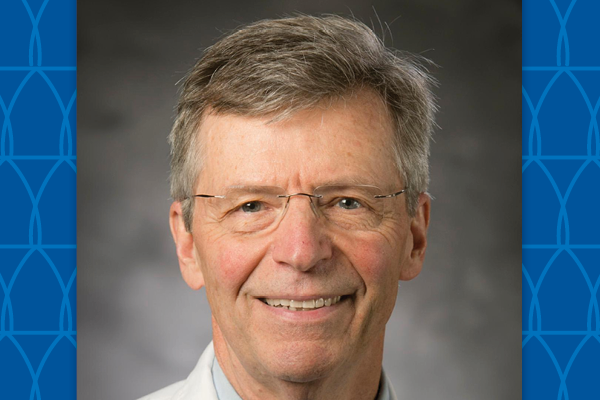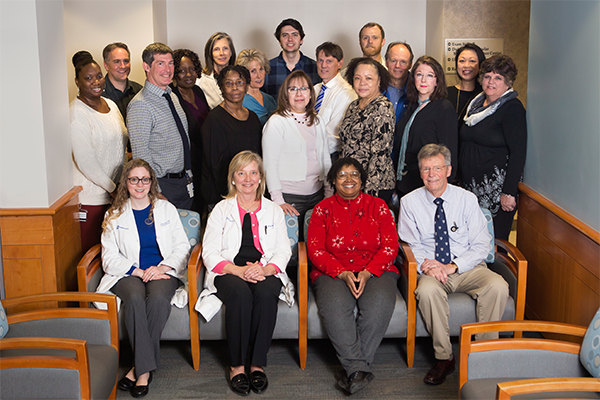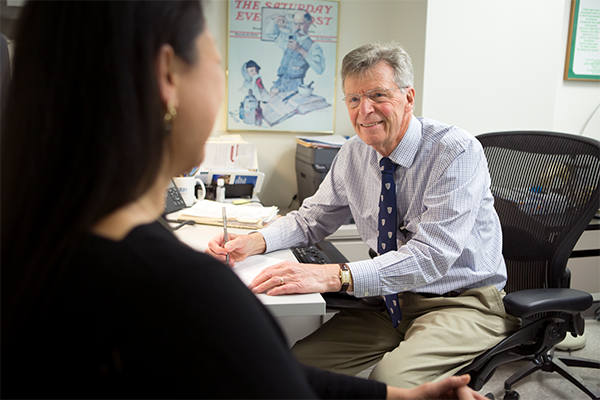
When George Jackson, MD, was in fourth grade, he had an encounter with a reporter that set him on the path to his future career. He was being interviewed for a profile in the Cleveland Plain Dealer, the paper Jackson delivered in his small town in northern Ohio. The reporter asked him what he wanted to be when he grew up. “A doctor,” he replied.
“I don’t know where that came from,” Jackson said recently. “There were no doctors in my family.”
Next the reporter asked, “Where do you want to go to medical school?” That question stumped Jackson. When no answer was forthcoming, the reporter said, “Let’s just say you’re going to go to Western Reserve [now Case Western Reserve].”
More than a decade later, Jackson was applying to medical schools, and his confidence was wavering after an intimidating interview at the University of Pennsylvania. What if he didn’t get in anywhere? “When I went to interview at Western Reserve in Cleveland, I took this article along with me,” he said. “I always tell people it was my savior in terms of getting into medical school.”
While at Case Western, Jackson had another chance encounter that influenced his career trajectory. He met a chief resident raised in Nicaragua who invited him to go there on a medical missionary trip. Jackson agreed and ended up doing so – about a dozen times. The trips changed his mind about becoming a general practitioner in his hometown. “It opened up [to me] the whole area of public health,” he said, “and thinking more broadly about what was important to the health of people.”

Thinking broadly about what is important to the health of the people is exactly what Jackson did during his 41-year career at Duke, where he was the director of Employee Occupational Health and Wellness (EOHW) and the chief of the division of Occupational and Environmental Medicine. He retired from Duke in 2023.
“He was able to view employee health from a whole-person perspective,” said Carol Epling, MD, who worked with Jackson for many years and succeeded him as EOHW director. “He recognized that we spend so much of our time here at work that there are many ways we can support our employees beyond the traditional scope of employee health.”
Jackson came to Duke from Mt. Sinai Hospital, where he was an assistant professor with a strong background in public health and substance abuse treatment. When he arrived at Duke in 1982, employee health was focused on making sure people could perform their jobs and on treating workplace injuries, but Jackson soon set about expanding that definition.
Launching the Personal Assistance Service, which offers free short-term counseling, was his first priority. In 1984, Duke was only the second university in the country, after the University of Missouri, to offer such a program.
Jackson introduced a university-wide smoking cessation program in 1985. A few years later, he collaborated with Andrew Wallace, MD, then CEO of Duke Hospital, to create the Live for Life program, which continues to offer support to all employees in improving and maintaining their health.
In addition, Jackson chaired a university committee in the late 1980s that established that substance abuse should be addressed as a health problem, not a moral failing.
In 1986, Jackson became the first chief of the Division of Occupational and Environmental Medicine in what is now Department of Family Medicine and Community Health. Under his leadership, the division formalized a residency program and built a robust research program, led by John Dement, PhD, professor emeritus. The division also provided occupational health services for employees at companies around the country.

“It was so invigorating,” Jackson said. “I not only interacted with health care professionals in the medical center, but all kinds of folks on campus, from police to English professors.” Reporting to human resources as well as the medical hierarchy kept him busy.
However, at a certain point Jackson realized he was ready to reduce the number of balls he was juggling. “For 10 years, I was division chief and director of Occupational Health, and that was when I started having trouble sleeping,” he said with a chuckle. “I stepped down from the division chief role in 1996.”
In 2012, when he was 70, he handed over the directorship of Employee Occupational Health and wellness to Carol Epling, whom he had hired in 1995. After passing the baton, Jackson kept working, at first full time, then part time, serving as “a wise source of advice,” Epling said.
Now that Jackson is fully retired from medicine, except for volunteer work for substance abuse recovery program TROSA, fate has presented him with a second career as a very involved grandfather. Sadly, in February, the same month he retired, his daughter-in-law died of a brain tumor. He and his wife are providing extra care and support for his son’s three children, aged 8, 6, and 6. The family, who had lived in New York, moved to Chapel Hill during the pandemic when it became clear that they were going to need ongoing help.
Jackson and his wife help with schoolwork and ferry the children to school, soccer practices, basketball games, and dance recitals. His wife, who was a school counselor in both Durham and Chapel Hill before she retired, is back in the schools as a volunteer.
“I don’t know what I thought I was going to do in retirement, but it’s clear that I have to be much younger than I am age-wise because I’m running around with kids,” he said. “Life throws you curve balls. But in some ways, it’s opened up things for my wife and me.”